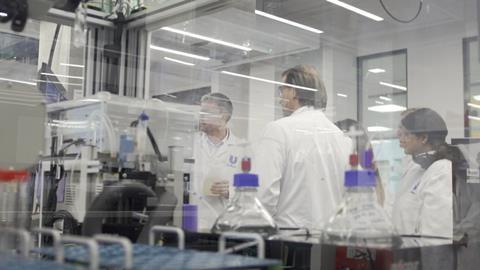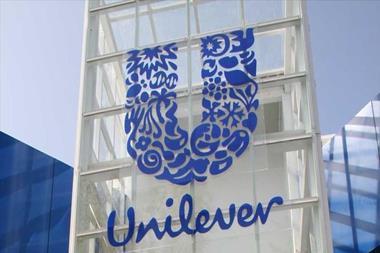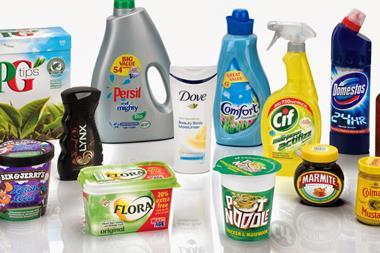Unilever’s sustainability pledges typically make headlines, and today’s announcement was no exception. This time, the Anglo-Dutch supplier is “reimagining the future of cleaning” by removing fossil fuel-based ingredients from its household portfolio worldwide. And it’s going to spend as much as €1bn (£888m) in doing so. Here’s how, and why.
What exactly has Unilever committed to?
It’s an initiative called ‘Clean Future’ – which the company describes as a “ground-breaking innovation strategy designed to fundamentally change the way that our cleaning and laundry products are created, manufactured and packaged”.
The main focus will be replacing 100% of the carbon derived from fossil fuels in Unilever’s cleaning and laundry product formulations with renewable or recycled alternatives by 2030.
That means the likes of Persil, Cif and Domestos will significantly reduce their carbon footprint. Currently, 47% of the carbon footprint of Unilever’s €11bn global household portfolio is the result of fossil fuel-based ingredients.
How on Earth is it going to achieve that?
Unilever has ringfenced €1bn to finance research into alternative sources of carbon sources – such as captured CO2, plants, marine algae and waste material like plastic. This will be achieved through biotechnology, low carbon chemistry, and biodegradable and water-efficient product formulations, among other R&D.
Work is already underway. Unilever has teamed up in India with Tuticorin Alkali Chemicals and Carbon Clean Solutions to make soda ash, a key a key ingredient in laundry detergent, from alternatives to fossil fuel. They have come up with a “cutting-edge” method to capture CO2 from their production processes and use it as a raw material to make soda ash.
In Slovakia, Unilever has partnered with biotech company Evonik Industries to develop rhamnolipids, renewable and biodegradable compounds that lower surface tension between two liquids. They’re already used in Sunlight (aka Quix) dishwashing liquid in Chile and Vietnam.
What are the potential benefits for the planet?
Unilever hasn’t offered an amount of unsustainable carbon it aims to axe. However, its move is clearly significant given the company is the world’s second-biggest maker of consumer goods. In the UK alone, its top laundry brands, Persil and Surf, last year shifted 87.8 million packs between them, while Domestos and Surf sold a total of 59.1 million units [Nielsen 52 w/e 7 September 2019]. That’s potentially a lot of oil-based ingredients about to be removed.
Even Greenpeace – arguably the biggest critic of Unilever’s environmental impact – seems pleased. “It’s good that Unilever is committing to reduce its dependence on fossil fuels, which are a disaster for the planet” says the organisation. Predictably, however, it goes on to call for even more commitment through “sustainable reusable systems across the board. Until they commit to stop using single-use plastic, corporations like Unilever are on the same planet-wrecking team as the fossil fuel industry.”
How does it fit into Unilever’s wider sustainability plan?
‘Clean Future’ is the latest scheme to realise Unilever’s pledge of net zero emissions from its products by 2039. And it’s a big one, with the same budget as the supplier’s Climate & Nature Fund, which will address issues such as deforestation, water stewardship and sustainable farming.
(A round-up of Unilever’s other notable green-minded moves can be found here.)
How does it compare with the rest of the industry?
On paper, it’s definitely more eye-catching – and arguably bolder – than similar aims of Unilever’s closest rivals in the consumer goods space.
However, in its most recent sustainability report, published in April, Reckitt Benckiser, owner of Dettol and Finish, reiterated its target of a 40% reduction in greenhouse gases from manufacturing and a one-third cut in carbon footprint “per dose” – both by this year. And RB stressed its continuing adoption of “safer and more sustainable” chemicals in its products.
Similarly, Fairy and Flash maker Procter & Gamble has vowed to “relentlessly pursue the best and safest ingredients from both science and nature”. It also wants to reduce the demand for water in production and/or product usage.

























No comments yet